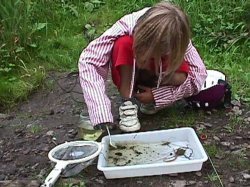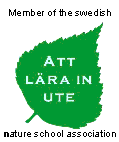|

Nature - The Best Classroom in the World

All children are born with curiosity and a desire to learn and play, a compulsion as strong as hunger or thirst. Love of nature is also inherent in all humans and knowledge of nature begins in nature. The best learning is achieved when using all parts your body: all senses, brain and heart, hand and foot. This is the method of Sweden’s nature schools - combining body and soul, lust for life and learning - out of doors! Nature tutors, teachers and students work to together to:
- explore and examine
- observe and draw conclusions
- discover and come to understand
- experiment and solve problems
Personal experience becomes the foundation on which we build learning, knowledge, an understanding of nature and how much we depend on it. Traditional school subjects such as history, geography and mathematics can also be taught out of doors. Join us in the best classroom in the world!
Children - The Best Teachers in the World
At the nature school, children can teach us adults just as much we can teach them. As a nature tutor put it; "Children are nature! We have so much to learn from how children play, how they interact with their environment. Children teach us that we must have fun and enjoy learning if knowledge is to linger within us".
A child from the nature school says; "I want to feel the sun, the wind and the rain. I become alert and I learn easier when I’m allowed to exercise my body".
This is the Nature School
The nature school is neither a building nor a place; it is a method of learning. The basic idea is learning out of doors. Games and outdoor education stimulate experience - curiosity - exploration - understanding. Learning out of doors also results in cheerful, open minded, brave and healthy children.
In 1982 the Swedish Environmental Protection Agency opened the first nature school in Skäralid in Söderåsen National Park in the south of Sweden. Currently Sweden has 70 nature schools and thousands of pupils participate in "outdoor days" every week. The national goal is to have at least one nature school in every municipal district.
Nature tutors educate teachers and children on sustainable environmental development (Agenda 21). The nature school’s preferred method of learning is discovery. Outdoor education lets children take the initiative and find a way to do an assignment.
The nature school is a resource available to children and teachers at all levels - from preschool to high school. Make use of us!
Outdoor days
Outdoor days often have themes that require preparation and can inspire farther work in the classroom. Examples of themes:
- The four seasons
- Our sensesFire
- Bugs
- Wetlands
- Ancient techniques
The Nature School Pays Off
Leaving the classroom for outdoor lessons has two huge benefits:
- better learning
- better health
Learning
Children in classes that have outdoor days:
- have better concentration skills.
- are better at taking well thought-out decisions.
- are better at planning and completing assignments.
- show less aggravation.
- are to a greater extent helpful to their classmates.
quotes:
"If you want to bring nature into your head, you will have to bring your head into nature."
Folke Frennhof, headmaster.
"Nature is our laboratory, our playground and our place of worship. At the same time it is our larder, our medicine box and our stock of resources."
Unknown.
"Without play there would be no artists, no inventors and no skilful engineers."
Birgitta Knutsdotter Olofsson.
"Nothing is new except for what we have already forgotten"
Neal and Palmer.
"Therapy gardens do wonders for those who are ill. But instead of taking care of those who have burnt themselves out, we should concentrate on preventing them from doing so."
Gunnar Sorte, professor, SLU Alnarp.
Health
Children in classes that have outdoor days:
- have fewer sick days.
- are calmer.
- have greater self confidence.
- are happier.
- have better mobility and sense of their body.
- resolve conflicts easier.
Then And Now
In older days we lived and worked close to nature. Today most of us live in cities. The city environment is usually not adapted to our human needs and valuable time and energy is wasted keeping it out.
Our reptile brain is constantly defending us against background noise. In nature, this function is not necessary. On the contrary, spending time in nature refills us with energy. The positive effects don’t wear off for quite some time.
In a modern city environment we are bombarded with information trying to catch our attention. And looking is seemingly free of charge. The price we pay is mental weariness. Nature provides with a place to rest. Trees and stones have no demands.
Invest In Our Children!
Children with positive experiences of nature grow up to be more active, healthier and more interested of nature as adults. Living close to nature activates our body and soul, it stimulates our feelings and our intellect. Your blood pressure decreases, the heart beats slower, the amount of stress hormones decreases and you sleep better. Resistance to allergies and infections is improved. The need for pain killers or other relaxing medicines decreases.
quotes:
"People born in the forties are the last people who, through their grandparents, have a natural link to the countryside. It’s sad that nature schools are needed, but good that they exist. There will be an even greater need for them in the future."
Ingvar Bingman, chairman of the foundation "Keep Sweden Clean".
"You need to touch to be touched."
Molander.
"It was nature that determined how we played and daydreamed."
Astrid Lindgren
Nature Heals
Nature is our home, a place where everyone is invited and welcome. The environments close to where we live and work are the most important. Walks in the park, outdoor life in the forest or by the sea, working in the garden or fishing, are all examples of activities that improve health and prevent sicknesses. Experiences in nature have a positive effect on endemic diseases as for instance:
- circulation diseases
- diabetes
- stroke
- bone diseases (osteoporosis)
- depression
- angst
- joint diseases (arthrosis)
- high blod pressure
Hospital patients who have gone through surgery recover approximately eight percent faster if they have a window overlooking a park, as opposed to a view of another building. They also require less medical attention and drugs during the recovery.
What Says Science?
Elisabeth Hurtig writes in her master’s thesis:
"All scientists and all literature are of the same opinion; the best education is achieved when learning is coupled with meaningful real life situations, i.e. learning in a context. Preferably out of doors, in nature."
Says brain scientist David Ingvar:
"It is crucial for our brains that we spend time out of doors, in the flow of sounds, light and forms that nature offers us. We need birds singing and wind blowing, sunlight and shadows, mist and colours, flowers and insects. The growth of the brain cells depends on this stimulation from nature. If learning becomes to boring, the brain simply shuts itself down."
quotes:
"The nature school is a prime example of good education where theory and practical work are combined. Using the body fuels mental activity."
Germund Sellgren.
SOURCES:
The Nature School and Outdoor Days, Outdoor Pedagogics and Practice - Elisabeth Hurtig M.A, Greenwich University.
The Importance of Contact with Nature for "Home Urbanis Juvenile" - Gunnar Sorte, professor, Institute of Landscape Planning, Swedish University of Agricultural Sciences, Alnarp.
The Importance of Nature and Gardens for Health and Quality of Life - Ingmar Norling, senior lecturer, Sahlgrenska University Hospital
Comparison of Child Behaviour at Preschools Lekatten and Statarlängan - R&D-project, Swedish University of Agricultural Sciences, Alnarp.
"Sit completely still and stare at a tree for so long that the tree starts staring back. Try it!"
Jan Danielsson.
The Nature School Associationis an organization for people working with outdoor pedagogics. We arrange courses and transfer knowledge and experience between nature schools in Sweden using our homepage, e-mail newsletters and a magazine published on a quarterly basis. We also provide support to municipal districts looking to start up a nature school of their own.




